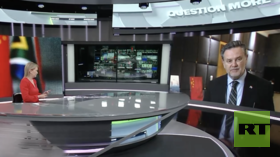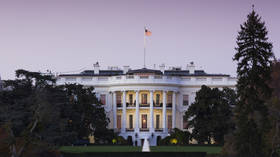Denial is America’s national pastime, but real patriotism requires honesty

Anti-patriotism is trendy thanks to the popular depiction of Trump as Antichrist, but the US’ decline has been a long time coming. Truly Making America Great Again requires dismantling the Potemkin village erected to hide the rot.
Trump seems convinced that the job of restoring America’s Greatness is mostly done, and even his detractors don’t seem aware of the very serious problems the country faces, instead shrieking about social issues and self-flagellating over assumed privilege. Historical or economic understanding is largely absent from the current “woke” critiques of America.
We have the greatest economy anywhere in the world. We have the greatest military anywhere in the world. Not bad!
— Donald J. Trump (@realDonaldTrump) July 3, 2019
As its economic fortunes began to decline in the latter half of the 20th century, the US government threw its considerable weight behind keeping up appearances, prioritizing maintaining the facade of a prosperous nation ahead of fixing the problems keeping prosperity at bay. Disciples of Milton Friedman’s neoliberal economics convinced the government that their only hope was to keep cutting taxes on the rich and hope they would eventually trickle a little down on everyone else. Admitting that this system had failed would betray weakness that would surely be leveraged into a full-fledged communist takeover. As a result, Americans have become shockingly adept at lying to themselves, and even the Trump era’s trendy antipatriots are defiantly setting off their fireworks, convinced that everything will be just fine once they get rid of that nasty old president.
The world's best military, or just its most expensive?
America’s once-mighty military-industrial complex, the best-funded sector of the economy, with more money flowing in than the next nine countries’ military budgets combined, is in such a sad state the government increasingly has to bully allies into buying its substandard product. Turkey, unwilling to back down on its purchase of the Russian S-400 missile system, was warned sanctions will be imposed after “threats” to exclude Ankara from the US’ troubled F-35 program failed to convince the country to cancel the Russian delivery. Nearly two decades in the making, the F-35 has been plagued by cost overruns, design issues, even security flaws that would have exposed foreign air forces’ private data to the Pentagon.
Also on rt.com Speed, performance, privacy & pain: But Pentagon says F-35 issues have ‘acceptable workarounds’The F-35’s problems are no surprise given that the weapons industry has been plundered like the rest of American manufacturing by the vulture capitalists of Wall Street. Private equity-style profiteering has delivered the Pentagon – the primary beneficiary of every American tax dollar – into the hands of monopolies. One company, an aerospace component manufacturer called TransDigm, has become the sole supplier for 80 percent of the markets it serves, cornering the market on what Rep. Ro Khanna (D-Calif.) called “rarely noticed ‘proprietary’ aerospace parts.” By taking control of 90 percent of the supply chain, it has consolidated its hold over the industry so thoroughly that despite being caught by the Defense Department’s Inspector General manipulating the market three times, it cannot, apparently, be stopped.
And TransDigm’s price-gouging is child’s play next to fellow monopoly L3 Technologies, which through size and connections is able to beat what few competitors it has to deliver overpriced and poor-quality products and leave the Pentagon holding the bag. L3 was even suspended from the Pentagon’s supplier list for using “extremely sensitive and classified information” to gain competitive advantage in the international market, and the company was forced to pay a $25.6 million settlement for knowingly supplying faulty weapons sights to US troops in Iraq and Afghanistan – for years. Yet it lives on, thanks to being the only company that can do the job.
The Pentagon was recently reminded of just how dire the situation has become when China hinted that it could bring the US economy to a screeching halt by holding onto its rare earth minerals. While the US developed the rare-earth magnets currently used in nearly every item of high-tech military equipment and consumer electronics, the Pentagon is now 100 percent reliant on China for 20 minerals needed to make everything from fighter jets to cell phones to batteries and computer chips.
This is no accident – Chinese investors were able to use the mechanisms of Wall Street to take control of the US’ rare earth industry and ship it overseas – and it doesn’t help that US banks have bent over backward to help in this not-so-hostile takeover. JP Morgan Chase was forced to pay the government $265 million for bribing its way into the Chinese Communist Party’s heart by hiring party members’ offspring, and Goldman Sachs and Citigroup are being investigated for their own nepotism-for-cash programs.
But hollowing out America’s once-thriving industries hardly counts as unpatriotic in a country where making money has long since supplanted making things as the pinnacle of human achievement. TransDigm and L3 are praised in Wall Street publications for their shrewd business decisions (“TransDigm managers don’t think like engineers,” The Street gushes in an article about how the company is “poised for supersonic growth” in the “new age of killer drones”). The government, conditioned by decades of neoliberal dogma that regulation spells doom for an economy, merely continues to throw money at the Pentagon with a quasi-religious faith that they can spend their way out of any problem.
Big Tech jumps ship
Even Silicon Valley, once the last hope for a nation that no longer builds anything, has been quietly offshored, shipped off to Israel over the past decade thanks in large part to hedge funder Paul Singer, who has worked hand in hand with PM Benjamin Netanyahu through his Start-Up Nation Central initiative, described as “a foreign ministry for Israel’s tech industry,” to make Big Tech an offer it can’t refuse. Rolling out the red carpet to multinationals like Amazon and Microsoft, populating their ranks with bright young alumni of the IDF’s Unit 8200 (often compared to the American NSA) and tempting them with a buffet of ripe-for-acquisition innovation-rich startups, Netanyahu has freely admitted he has a “very deliberate policy” to make Israel boycott-proof by making it the center of the Big Tech universe. With foreign investment in the Israeli tech sector nearly quadrupling over the past four years, he’s largely succeeded - at the expense of Silicon Valley.
Intel’s announcement earlier this year that it would invest $11 billion in yet another Israeli factory was followed by hundreds of stateside layoffs; the company cut 12,000 US jobs in 2016, and last year plowed $5 billion into another Israeli factory. Intel is cleaning up, with hefty subsidies from both US and Israeli governments - but only one country is getting a return on its investment. Microsoft, which has unilaterally appointed its ElectionGuard software the sentinel of American democracy, is increasingly leaving the US behind, cutting American jobs while building new campuses and investing billions of dollars in research and development in Israel. The states of Washington, Iowa and Virginia even paid them almost $197 million over the past four years as they expanded their footprint overseas. It’s no wonder Apple, Amazon, Facebook, and Google are quietly packing up and leaving, too. Nice work, if you can get it.
Back to your regular broadcast
What does the US have left? The media, which should be sounding the alarm over the increasingly desperate looting of the nation, is instead a microcosm of the same catastrophe. Best exemplified by the grotesque pageantry of CNN - a network which purports to be a private company but is forced to pad its commercial breaks with ads for defense contractors like Boeing and Raytheon - the media was, until a few years ago, exclusively deployed to tell Americans that everything was just fine at home - it’s the rest of the world we have to bomb until they accept our superior freedoms.
Also on rt.com US mainstream media worships superficial 'diversity,' but diversity of thought is forbiddenCNN’s second-quarter average daily viewership was 541,000, a drop of 18 percent from last year. That figure includes all the waiting rooms, bank lobbies, airports, and other passive screens that run CNN all day, every day, no matter who is - or isn’t - watching. Even the top-rated network, Fox, had just 1.32 million viewers on an average day, less than one percent of the American population. These networks are barely keeping the American exceptionalism narrative together, and indeed wouldn’t stand a chance if denial wasn’t so firmly instilled in our national character.
Americans need not be ashamed of their patriotism - it's only natural to feel a sense of pride for the country of one's birth - but if we really love America, it's time to take an honest look at what needs to be fixed.
Helen Buyniski
Like this story? Share it with a friend!
The statements, views and opinions expressed in this column are solely those of the author and do not necessarily represent those of RT.












